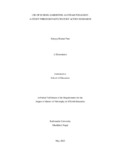
Please use this identifier to cite or link to this item:
https://hdl.handle.net/20.500.14301/338| Title: | USE OF SCHOOL GARDENING AS STEAM PEDAGOGY: A STUDY THROUGH PARTICIPATORY ACTION RESEARCH |
| Authors: | Pant, Sanjaya Kumar |
| Citation: | Pant,S>K.(2023).Use of School Gardening as STEAM Pedagogy: A Study through Participatory Action Research |
| Issue Date: | May-2023 |
| Publisher: | School of Education |
| School: | SOED |
| Department: | DOSE |
| Level: | M.Phil. |
| Program: | MPhil in STEAM Educaiton |
| Abstract: | Before the beginning of school gardening activities at Shree Janahit Secondary School, Dharmashala, Namobuddha Municipality-7, Kavre, I visited school and community, and interacted with schoolteacher, students, and parents a couple of times. It was considered a leader school where university researchers used to undertake initial interventions, and I being a continuum in the process discovered their needs and interests where school teacher, students, and school management committee (SMC) were motivated to onset place-based learning in our attempt of contextualizing curricula. With the purpose to explore and use school gardening as STEAM pedagogy, we began to collaborate with school teacher, students, parents, and community members, and formed a school gardening club (SGC). It consisted of a team of participatory action researchers who considered positivism, criticalism, interpretivism and post-modernism as major philosophical dimension under multi paradigmatic PAR. And, informed with several aspects of socio-scientific issues (SSI) while designing eco-san based school garden, we involved in mutual dialogue, argumentation, informal reasoning and discussion with stakeholders. In a set of two PAR cycles (i.e. plan, act, observe, and reflect), researcher and co-researchers sowed the seed of gardening activities in twelve different plots (triplicates of four groups) designed under four polyhouse. Compared with control (C) group (20kg), the yield of vegetable was highest in human urine and biochar (UB) treated group (84 kg), followed by urine (U) treated group (63 kg) and chemical fertilizer (CF) treated group (58kg). With this experimental design, we had to learn to appreciate local resources and knowledge as they might be the most undervalued resources in our context. School gardens would empower us not only in building local economies but also strengthen us to stand on our own feet. From pedagogical vantage, the school gardening could be an immediate and effective means and ways to contextualize our curricula by rationalizing disempowering forces prevalent in our practices. While we involved in designing STEAM projects in context of school gardening, it not only harnessed soft skills in learners, rather provided opportunity of self-transformation. Beside this, integration of artificial intelligence (AI) in the second cycle of PAR enabled us to realise how far/ near we are from Industry 4.0., and it in turn accelerated our pace of glocalization. |
| URI: | https://hdl.handle.net/20.500.14301/338 |
| Appears in Collections: | Dissertation |
Files in This Item:
| File | Description | Size | Format | |
|---|---|---|---|---|
| SanjayaThesis _ Checked.pdf | 7.52 MB | Adobe PDF |  View/Open |
Items in DSpace are protected by copyright, with all rights reserved, unless otherwise indicated.